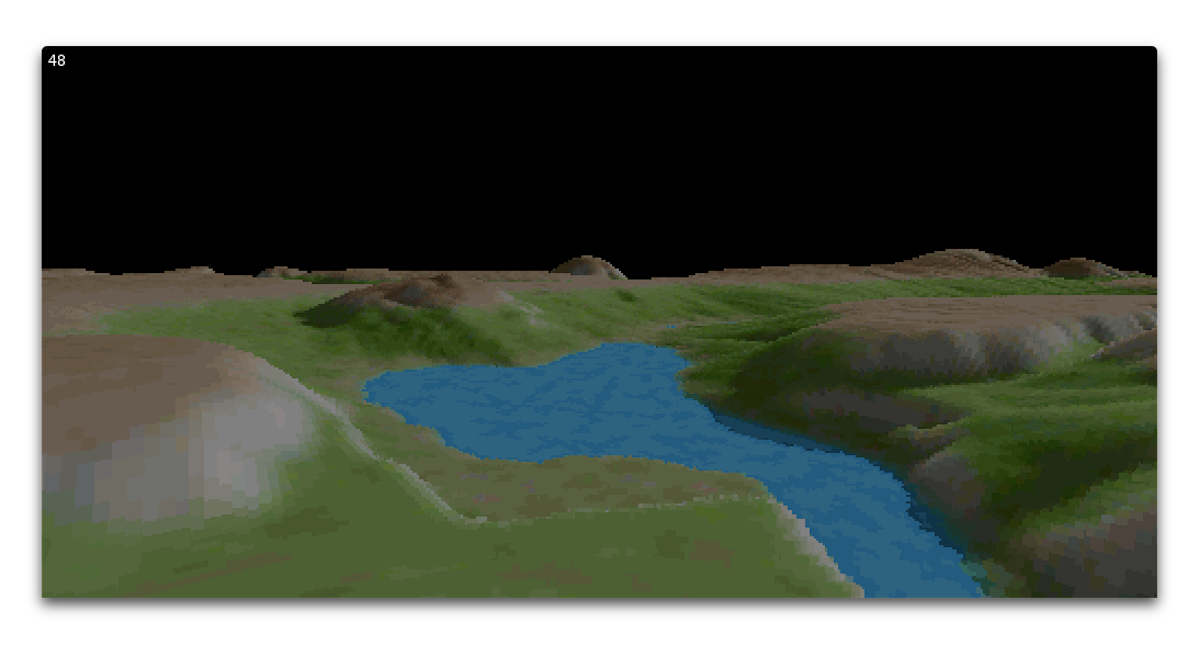Wonkey is a easy to learn, oriented object, modern and cross-platform programming language for creating cross-platform video games, highly inspired by the “BlitzBasic” range of languages.

| Windows | MacOS | Linux | Raspbian |
|---|---|---|---|
| Android | iOS |
|---|---|
| Emscripten |
|---|
Website: https://wonkey-coders.github.io/
Github page: https://github.com/wonkey-coders
Discord channel : https://discord.gg/awfuRtZay7
Join the community and improve this programming language.
Enjoy!
Wonkey on Raspbian (Raspberry PI 4)

Click screenshots to run the examples in browser:
You need a working C/C++ developement environment for desktop targets, Emscripten for web target. Android NDK for mobile target.
Targets:
If you are reading this on Github, please note there are prebuilt versions of wonkey (with complete source code) available from https://github.com/wonkey-coders/wonkey/releases.
Unless you are using one of the prebuilt releases, you will need to install the mingw-64 compiler. There are self-extracting archive of mingw-64 that has been tested with wonkey here :
- x86 : i686-6.2.0-release-posix-dwarf-rt_v5-rev1.7z
- x64 : x86_64-8.1.0-release-posix-seh-rt_v6-rev0.7z
If you install this to the wonkey 'devtools' directory, the following steps should 'just work' (ha!) else you must added mingw64\bin path in your environment variables.
NOTE: Wonkey use x64 by default. See bin\windows\env_windows.txt file for more information.
Wonkey auto-detected your MSVC installation and use it by default, no need to changes anymore.
If you want using GCC, you need to change WX_USE_MSVC variable in bin\windows\env_windows.txt.
Follow the next steps to build :
- Open a command prompt and change to the 'wonkey\scripts' directory.
- Enter
rebuildall.batand hit return. Wait... - If all went well, you should end up with a 'Wonkey (windows)' exe in the wonkey directory. Run this to launch the WIDE (Wonkey IDE).
- You should now be able to build and run wonkey apps. There are some sample apps in the 'wonkey/examples' directory.
-
On MacOS, install the XCode command line tools. You can do this by entering in a shell :
-
xcode-select --install
Additionally you need to install the ncurses package:
1.) Using Homebrew:
brew install ncurses
See https://formulae.brew.sh/formula/ncurses
2.) If you like a visual package manager for Homebrew, use Cakebrew
-
-
On Linux, install the GCC toolchain and libraries. You can do this by entering in a shell :
-
sudo apt-get install g++-multilib libopenal-dev libpulse-dev libsdl2-dev ncurses-dev
-
You may want to use the following install script as an example:
# # Install Wonkey on Linux Mint (https://linuxmint.com) into %USER%/wonkey # cd ~/ sudo apt-get update sudo apt-get install git g++-multilib libopenal-dev libpulse-dev libsdl2-dev git clone -b develop --single-branch --depth 1 https://github.com/wonkey-coders/wonkey cd wonkey/scripts ./rebuildall.sh cd .. ./bin/linux/wide/wide
-
-
On Raspberry Pi OS, install the GCC toolchain and libraries. You can do this by entering in a shell :
-
sudo apt-get install git libopenal-dev libpulse-dev libsdl2-dev libncurses5-dev libncursesw5-dev libasound2-dev libudev-dev libxi-dev libxxf86vm-dev mesa-common-dev
-
You may want to use the following install script as an example:
# # Install Wonkey on Raspberry Pi 4 into %USER%/wonkey # cd ~/ sudo apt-get update sudo apt-get install git libopenal-dev libpulse-dev libsdl2-dev libncurses5-dev libncursesw5-dev libasound2-dev libudev-dev libxi-dev libxxf86vm-dev mesa-common-dev git clone -b develop --single-branch --depth 1 https://github.com/wonkey-coders/wonkey cd wonkey/scripts ./rebuildall.sh
-
Follow the next steps to build :
-
Open a shell and change to the 'wonkey/scripts' directory.
-
Enter
./rebuildall.shand hit return. Wait... -
If all went well, you should end up with a 'Wonkey (...)' app in the wonkey directory. Run this to launch the WIDE (Wonkey IDE).
-
You should now be able to build and run wonkey apps. There are some sample apps in the 'wonkey/examples' directory.
See installation instructions from Emscripten site.
# Get the emsdk repo
git clone https://github.com/emscripten-core/emsdk.git
# Enter that directory
cd emsdk
# Fetch the latest version of the emsdk (not needed the first time you clone)
git pull
# Download and install the latest SDK tools.
./emsdk install latest
# Make the "latest" SDK "active" for the current user. (writes .emscripten file)
./emsdk activate latest
# Activate PATH and other environment variables in the current terminal
source ./emsdk_env.sh
#In the description above we asked the emsdk to install and activate latest, which is the latest tagged release. That is often what you want.
# You can also install a specific version by specifying it, for example,
./emsdk install 1.38.45
NOTE: on macOS, you can use brew install emscripten.
NOTE: on Windows, run emsdk instead of ./emsdk, and emsdk_env.bat instead of source ./emsdk_env.sh.
Before setup, you need to build modules for web target from wake command:
wake mods -target=emscriptenYou must setup MacOS environment first and you need build modules for iOS target from wake command:
wake mods -target=iosTODO
wake mods -target=androidℹ️ More complete help and samples are available online at https://wonkey-coders.github.io/.
function main()
print "Hello, Wonkey!"
endWhile staying true to the 'basic' style of the original Blitz languages, Wonkey offers some very powerful new features including:
Classes, interfaces, structs, methods and functions can have 'type' parameters.
struct Rect<T>
field x0:T, y0:T
field x1:T, y1:T
end
'Main entry
function main()
local r:=new Rect<Float>
endFunctions (and methods) can be stored in variables and passed to/from other functions.
function Test1()
print "Test1"
end
function Test2()
print "Test2"
end
function Tester( test:void() )
test()
end
'Main entry
function main()
Tester( Test1 )
Tester( Test2 )
endLambda functions allow you to create closures.
function Test( func:Void() )
func()
end
'Main entry
function main()
for local i:=0 until 10
Test( lambda()
print i
end)
next
endStructs are similar to classes in that they encapsulate member data, but differ in that they are passed around 'by value' instead of 'by reference'.
This allows structs to be efficiently create on the stack without any garbage collection overhead.
struct S
field data:Int=10
end
function Test( s:S )
s.data = 100
end
'Main entry
function main()
local s:=new S 'Create a new S on the stack (very fast!)
Test( s ) 'Test gets a copy of 's'
print s.data 'Print '10'
endFibers provide support for 'cooperative' multi-threading.
function Server( host:String, service:String )
local server:=Socket.Listen( host, service )
repeat
local client:=server.Accept()
new Fiber( lambda()
local data:=client.Receive(...)
end )
forever
endOperator overloading allows you to override the meaning of the built-in language operators, making for more expressive code.
struct Vec2
field x:Float
field y:Float
method new( x:Float,y:Float )
self.x=x
self.y=y
end
operator+:Vec2( v:Vec2 )
return new Vec2( x+v.x,y+v.y )
end
operator to:String()
return "Vec2("+x+","+y+")"
end
end
'Main entry
function main()
local v0:=new Vec2( 10,20 )
local v1:=new Vec2( 30,40 )
print v0+v1
endClass extensions allow you to add extra methods, functions and properties to existing classes.
struct Foo
field i:Int=0
end struct Foo extension
method Increment()
i+=1
end
endWonkey provides a 'mostly' incremental garbage collector that efficiently collects garbage as it runs without any of those annoying 'sweep' spikes found in typical garbage collectors.
Wonkey includes an optional reflection system that allows you to inspect and modify variables and values at runtime:
#import <reflection>
class C
method Update( msg:String )
print "C.Update : msg=" + msg
end
end
'Main entry
function main()
local c:=new C
local type:=typeof( c )
print type
local decl:=type.GetDecl( "Update" )
decl.Invoke( c, "Hello World!" )
end
Wonkey is an community project and an fork of Monkey2 programming language designed by Mark Sibly, creator of the 'Blitz' range of languages.



